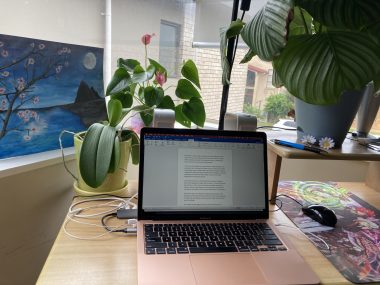An Amyloidosis Toolkit Helps Us Navigate Tough Times

Every week I sit at my desk and ponder what I should write about. As I stare out the window that faces my street, I reflect on everything my husband, Aubrey, and I have encountered on our amyloidosis journey, and the tools that have helped us survive.
I’m not a caregiving expert. Through my columns, I simply want to extend warmth and empathy to readers, and let them know that someone here in Auckland, New Zealand, is walking with them. Living with hereditary ATTR amyloidosis can be lonely, especially because the disease still isn’t well understood.

My writing corner. (Photo by Jaime Christmas)
After Aubrey was diagnosed in 2013, I found myself grasping for support and information. Although it wasn’t very long ago, advice was scarce and support was tough to come by. New Zealand may be known for its beauty and friendliness, but living here can be especially isolating for those with rare conditions.
Fast-forward to 2022, and the diagnosis and treatment landscape is still lackluster, but there’s been some improvement. Our community celebrates progress, no matter how small, and none of us are alone. No matter where you’re at on your amyloidosis journey, countless people and agencies, myself included, are eager to help.
If you or your loved one is newly diagnosed, one of my biggest pieces of advice is to prepare an emergency toolkit by considering what all you may need on this journey. Looking back, I wish someone had told me that I’d need to strengthen certain personal qualities and let go of certain people and things in order to face the challenges of hATTR amyloidosis. This might have helped me avoid some painful pitfalls.
I recommend including the following things in your amyloidosis toolkit:
‘Flashlight with spare batteries’
Both patients and caregivers need to dig deep to find hope to carry them through tough times. This source of light helps us to see and focus on what is essential.
Aubrey and I rely on responsibility and faith as our “flashlights.” We keep each other afloat because as torchbearers, we are committed to caring for each other.
The spare batteries are our family and friends.
‘Radio with spare batteries’
Be sure to identify your advocates, whom you can “call on the radio” in times of need. Campaigning for your well-being is important, but not always possible. Start with the people closest to you and ask them to speak up on your behalf. With a lesser-known illness, it can be more challenging to get people to pay attention.
We can’t assume that people working in welfare or healthcare understand amyloidosis and know how to help patients. You may need to reach out to disease advocates and organizations. I am a patient advocate for amyloidosis sufferers in New Zealand, and I am happy to help them find necessary support and assistance.
Protection supplies
In an emergency event, you need proper clothing, shelter, nourishment, and basic medical supplies. As an amyloidosis patient or caregiver, scrutinize your life and your environment closely, and consider what is and isn’t necessary. Will the things or people you have on hand benefit you a year from now?
We’ve had to let go of ideas, hopes, dreams, and even friends who no longer benefited us. This may sound selfish, but there’s nothing wrong with focusing only on what’s necessary when you have a terminal condition. In the long run, you may actually gain much more by letting go.
Note: FAP News Today is strictly a news and information website about the disease. It does not provide medical advice, diagnosis, or treatment. This content is not intended to be a substitute for professional medical advice, diagnosis, or treatment. Always seek the advice of your physician or other qualified health provider with any questions you may have regarding a medical condition. Never disregard professional medical advice or delay in seeking it because of something you have read on this website. The opinions expressed in this column are not those of FAP News Today or its parent company, Bionews, and are intended to spark discussion about issues pertaining to familial amyloid polyneuropathy.








Cynthia James
Thank you for writing these articles. Your warmth and empathy certainly comes through and is greatly appreciated. I always look forward to reading your next article. Thank you!
Jaime Christmas
You have made my day Cynthia. Thank you for your lovely words. You are very kind.